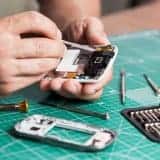How to Start a Car Dealership
Have you always wanted to start a car dealership, but been unsure how? Here, we’ve round up the essential advice you’ll need in order to start a car dealership that becomes a booming success.
Since its inception, the auto industry has been a cornerstone of markets both American and international. Given how busy all of us are these days, being able to get around is an essential part of both our professional and social lives. If you’re enthusiastic about cars and you’ve got a good head for business, it could be a great idea for you to start a car dealership. Read on for the steps you’ll need to take in order to get started and important considerations for you to keep in mind.
Any new business needs a solid business plan to start out with — among other things, it should detail the source and amount of your startup capital, your plan for breaking even and growing, and a solid analysis of the market you’ll be working with. Check out our free business plan templates to help you get started.
Also be sure to check out our previous articles about the different business structures available to you in the United States, the UK, and France. Before you start a car dealership, it’s important that you’ve determined which structure is appropriate for your business: in order to determine this, you’ll need to take numerous factors into account, so be sure to consider this step carefully and work it into your business plan.
Start a Car Dealership: First Steps
First, you’ll need to decide exactly what kind of car dealership you’re running. Many dealerships operate and make a profit by buying vehicles wholesale, either at auction or by their own research, and selling them at an increase. However, you may also decide that you prefer to sell new cars, in which case you’ll need to get in contact with the manufacturer of your choice and learn more about their franchising options.
Before you start a car dealership, you’ll need to conduct a thorough analysis of your market — what kind of demand is there for automobiles in your area, and what kind? Consider the weather and driving conditions in your area, the age and income level of your local population, and elements that customers are prioritizing. Is four wheel drive an essential, or are your customers more invested in the environment and switching to hybrid or electric vehicles? What are other car dealerships in the area selling, and where is the potential gap in the market? These considerations will have an impact upon the cars you end up offering to your clients.
You’ll need a specific license to operate a car dealership, and in most places you’ll need to obtain a surety bond — a kind of insurance that protects your customers from fraud and also assures them that you as a dealership are financially secure. While this varies from state to state, the class of license for which you apply will depend upon:
- whether you’re selling new or used vehicles as your primary activity
- whether you have repair facilities on site to fix warrantied vehicles
- whether you’re buying or selling used parts and/or assembling them
Your surety bond depends upon what “class” your dealership belongs to, and you should keep in mind that this bond for used car dealerships can, depending upon the state, be quite expensive (in Massachusetts, for example, it’s $25,000 cash or collateral). The Department of Motor Vehicles is the competent authority for filing licenses and surety bonds — you can check out state-by-state requirements on their website. Keep in mind that depending on what you sell, you may need to purchase several types of bonds: there are also motorcycle bonds, RV bonds, used car dealer bonds, DMV bonds, and more.
As with any other business, you’ll need to name it, open a dedicated bank account, and decide upon your ideal business structure (you can check out our guides for business structures in the US, UK, and France), and file with the IRS for your Employer Identification Number (EIN) if you’ll be hiring employees. You should also keep in mind that you’ll need to file Form 8300 with the IRS whenever you receive cash payments of over $10,000, and you’ll need to register for both state and federal taxes.
Location, Location, Location
Before you start a car dealership, you’ll want to carefully consider your location and the space you’ll be using. Car dealerships tend to require both visibility and a large lot upon which to house all your merchandise. Many car dealerships operate alongside busy roads and highways, both for visibility as well as for logistics. You’ll need a showroom and a lot, and you may also need to take a service department into account. This is a department that requires both space and relatively heavy investment in equipment, but it’s an important aspect of many car dealerships. Your business plan will have outlined not only where you plan to locate your dealership, but also the price of your floorplan and how you intend to finance your space.
Providing Service and Building Relationships
With more and more customers buying and researching cars online before they buy, competition is stiff. However, no matter where you buy your car, you’ll eventually need to get it serviced. When you start a car dealership, it’s wise to consider including a service department for this very reason. First of all, especially if you’re selling used cars, you’re going to need to service them before sales anyway. It’s a facility that any used car dealership should have. Furthermore, it’s also a new point of contact with your business for customers who may not have bought their most recent vehicle from you, but come to you for repairs. When you start a car dealership, it’s essential for you to build a relationship with your customers and your locality; providing a service department can be a valuable way to serve your area as well as to start building lasting relationships with the people who live there. For example, a customer who comes to you originally for service may also come to you to buy their next car; it’s just important that you use physical services like this not only to meet customers, but to keep in touch and build a relationship with them.
Expanding your business services from simply selling vehicles to servicing them will also increase customer’s trust in your business. Having a service department probably means you’ll need to employ mechanics who know their way around a variety of automobiles, and customers want to feel that they’re purchasing goods and services from a business who knows their craft inside and out. By showing your customers that you don’t just hawk merchandise, you can fix it as well, you’ll establish yourself as a reputable dealership early on.
While starting a car dealership certainly comes with difficulties like DMV bonds, licenses, and tax filing procedures, it’s a business that remains extremely relevant to customers all over the world. By keeping up with trends in the auto world, like electric and hybrid cars, motorcycles, and more, you’ll ensure that your products appeal to a variety of customers in your area. By including a service department, you’ll also be able to form lasting relationships with customers who may come back to invest in a vehicle. As long as you make sure your business plan is solid and you surround yourself with competent people, you’re on the right track to start a car dealership that’ll be a roaring success.



























